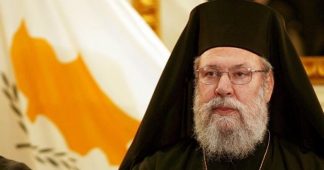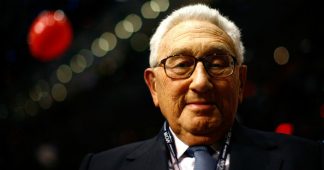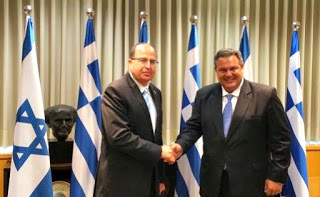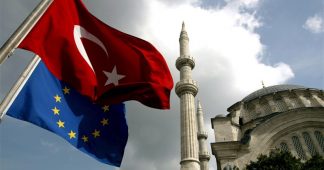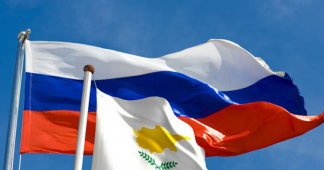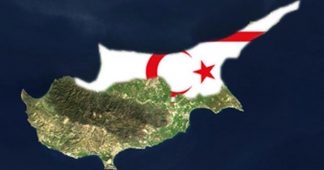By Kostas Sapardanis
Original post date: 18 March 2016
The dichotomy of Cyprus constitutes a singularity within the western world as it is the spot with the only hostile borders within the alliance of NATO, the last city to be divided in two and the last borders between the British Empire and its previous subjects. The green line (named after the color of the marker used by a British officer to crudely mark the new borders on the map) signifies a historic tragedy in which the leading roles were held by Cyprians, Greeks, Turks, Americans and British.
After the 2nd World War the decolonization of Britain did not extend to Cyprus because of the important position of the British bases on the island, which is very close to the Middle East. In 1955 the Greek Cypriots, demanding Union (“Enosis”) with Greece, resorted to an armed struggle against the British, and the Turks replied with a claim to dichotomize (“Taksim”) the island, taking arms as well. The conflict ended in 1960 with the signing of the independence declaration among Britain, Greece and Turkey. In 1963 new conflict between the two nationalities of the island broke out and the Turks requested again the division of the island in two. The United Nations intervened and an awkward cease of fire took place. The Greek junta of ’67 aspired to the annexation of Cyprus under its rule and detested the Archbishop Makarios who had abandoned the idea of Union for the sake of a peaceful cohabitation.
When the dictator Ioannidis attempted a coup in Cyprus he must have been feeling certain of the result, not just because he had the support of the Greek Cypriot National Guard but also because he had the support of the United States of America (whose foreign policy had by then replaced the British as the leading one in the region), under the guidance of the secretary of state, Henry Kissinger. But Ioannidis failed to assassinate Makarios, and only forced him to exile and replaced him with the far-right winged Greek Cypriot Nikos Sampson. Turkey replied by invading the island five days later, on the 20th of July 1974, occupying 3% of the land at one stroke. The Greek junta collapsed after a second wave of attack in August, when Turkey managed to occupy 40% of the island and Makarios returned to his shrunken state. What followed were population exchanges, violence, disappearances of citizens and the founding of the Turkish Cyprian pseudo-state. James Calahan, the British minister of foreign affairs, reports that Kissinger vetoed at least one suggestion of a British intervention to avoid the Turkish invasion.
Kissinger considered Makarios to be overly independent and feared that if the archbishop (who was also the democratically elected President) would remove the military men responsible for the coup against him, the communist influence would be too strong in Cyprus and the country would perhaps turn to the Soviet Union to deal with the Turkish element of the island. In his book, Years of Renewal, Kissinger describes Makarios as “the proximate cause of most of Cyprus’s tensions”. It is also a known fact that he considered Makarios to be the “Fidel Castro of the Mediterranean”; both claims are widely thought to be unfounded (a communist Orthodox Christian Archbishop would surely be a novelty).
he wish of the Greek junta (an American client) for the removal of Makarios was known to everyone. That Kissinger had the same wish is proved by his own writings and a memorandum by Thomas Boyatt (head of his State Department Cyprus Desk), who described in detail the reasons that made him believe Ioannidis was priming an attack against Cyprus and Makarios. He also made it clear that the absence of a representation by Kissinger to Athens was equal to an endorsement by the US. Such representation was never sent. One month before the coup the newspaper National Intelligence Daily published the views of the dictator, where he is seen supporting the idea that Greece could remove Makarios and his supporters within 24 hours without one drop of blood, and with Turkish consent. All this shows that Kissinger’s claims, that he was not privy to the coup before it was enacted, are contradicted by his own words, his associates’ reports and the press of the time. Besides, if Makarios was “the proximate cause of the tensions”, as he wrote, what would make him happier than to remove him?
Kissinger made the US the only country to recognize Sampson’s state when he ordered his country’s diplomatic mission in Nicosia to receive Sampson’s “minister of Foreign Affairs”, while, in the 22nd of July when Makarios went to Washington, he would meet with archbishop Makarios (and not the “President of the Cyprian Republic” Makarios).
Moreover, the ministries of Foreign Affairs and Defense of the USA had repeatedly expressed their preference for a dichotomized Cyprus since, in this way, the influence of the “dangerous” and “incontrollable” Makarios would be diminished and this turn of events would give them the opportunity to approach Turkey for the placing of military bases on the island, opposing the Soviet Union. It would be preferable and more reasonable, given the demographic composition of the island, for this dichotomy to be made by Greece, and this is the reason for Kissinger’s support for Sampson’s coup; but, when this became impossible with the failing of the coup, Turkey was the next best thing. Therefore, Kissinger went ahead and sided with Turkey invading the island and protected Ankara from any reprisal from the American Congress for this pointed infraction of international law, and even offered weaponry (according to CIA’s reports now made public) to succeed where the first effort failed.
An exponent of realpolitik (policy of power, directed on realistic goals instead of idealistic concepts, removed from ethical hindrances), Kissinger did not hesitate, using secret communication channels and sidestepping democratic procedures of his own country, to create conditions of animosity and utilize them in the interest not only of his country but his own as well. He thought “power is the ultimate aphrodisiac” and throughout his life he got so much power himself that he has managed to escape until today the wrath of the people and the punishment of justice (let alone that he earned the admiration of the likes of the liberal Stephen Colbert), despite his many misconducts in Vietnam, Cambodia, East Timor, Bangladesh, Chile, Indochina and any other spot on the map that had the misfortune of being the object of his attention.
